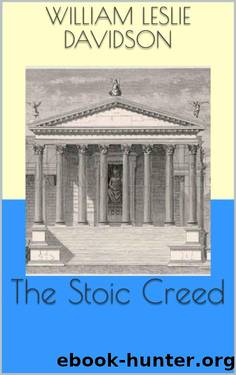The Stoic Creed (Stoicism Book 24) by William Leslie Davidson

Author:William Leslie Davidson [Davidson, William Leslie]
Language: eng
Format: epub
Published: 2017-07-24T18:30:00+00:00
Epicurean Hedonism
The Stoic doctrine of virtue as the ethical end will still further be elucidated, if we refer to the contrasting doctrine of pleasure. To the Epicurean teaching of pleasure as the summum bonum, the Stoics were in entire and absolute opposition. They attacked it with unwearied persistence, and with many argumentsâthe most striking of which were drawn from the psychology of pleasure and pain.
(1) In the first place, they objected to the term â pleasure â as being ambiguous. It refers properly, they maintained, only to bodily pleasures, or, in addition, to such secondary pleasures as can be traced ultimately to the body as their source ; but the Epicureans often gave it a wider connotation, and thereby gained an illegitimate plausibility for their doctrine.[153] (2) In the next place, pleasure, even as applied to agreeable sensation, has two meaningsâ(a) the positive signification of a settled state, and (b) the negative signification of mere absence of pain ; and these two are by no means the same thing. (3) Again, if pleasure be the highest good, then pain ⢠must be the greatest evilâthe two are incompatible ; and so a man in pain must be the most miserable and pitiable of beings. But, as a matter of fact, pain is regarded by the virtuous as quite secondary, and, while they bear it with magnanimity, they can be entirely happy under it, seeing that their mind or conscience is at rest. (4) Once more, virtue is universally admired and praised, not because of the pleasure it procures, but because it is virtue ; and if people ever suspect that a moral hero has acted as he did simply for the sake of pleasure, they at once cease to regard him as a hero. (5) But, even as applied to bodily sensation, pleasure is not the sign of health and continued efficiency, but is an index of degeneracy and declineâit is the indication that a faculty or organ has reached its highest point and is on the way to decay. (6) Then, again, the doctrine was attacked on the ground that it takes account only of a part of human nature, and omits its altruistic and sympathetic side. This was a line of attack that was possible only to developed Stoicism, when the value of the humaner virtues came to be realized ; but it is very frequent in (say) Epictetus. It was aimed at the Epicurean conception of â unperturbedness â [154] as the supreme goodâthe state of agreeable feeling, unalloyed by pain ; thereby making the feelings the criterion of moral worth, and placing manâs peace of mind in something that was essentially fleeting and unstable. This appeared to Epictetus to be a wholly mistaken and a very derogatory view to take. Of it he said contemptuously, that Epicurus had placed manâs good in â the husk â (meaning the body), and so had to ⢠maintain that, though a social being, a man must not yield to
Download
This site does not store any files on its server. We only index and link to content provided by other sites. Please contact the content providers to delete copyright contents if any and email us, we'll remove relevant links or contents immediately.
Walter Benjamin and the Actuality of Critique by Carlo Salzani(377)
Delphi Collected Works of Karl Marx (Illustrated) by Karl Marx(372)
Mortal Subjects by Christina Howells(315)
Philosophy of Mind: 50 Puzzles, Paradoxes, and Thought Experiments by Torin Alter & Robert J. Howell & Amy Kind(306)
Bushido: The Soul of Japan by Inazo Nitobe(285)
Wisdom For A King by Kapil Gupta(269)
Albert Camus by Foley John(234)
The SPCK Introduction to Simone Weil by Stephen Plant(228)
The Little Book of Stoic Quotes: Philosophy for a Meaningful and Courageous Life by Phil Van Treuren(225)
Nietzsche's Philosophical Psychology by Riccardi Mattia;(221)
The Wall Speaks by Jerr rreJ(216)
Jean-Paul Sartre by Churchill Steven; Reynolds Dr. Jack;(208)
Notes of an Underground Humanist by Chris Wright(195)
The Philosophy of Hope; Beatitude in Spinoza by Alexander Douglas(183)
Love Your Life by Dominque Bertolucci(181)
Jacques Ranciere by Deranty Jean-Philippe;(180)
Seeing Through Christianity: A Critique of Beliefs and Evidence by Bill Zuersher(165)
The Stoic Creed (Stoicism Book 24) by William Leslie Davidson(162)
Complete Works of Aeschines by Aeschines(150)
